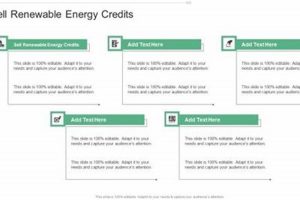
The financial gains stemming from solar renewable energy certificates (SRECs) may be subject to taxation. These certificates represent the environmental benefits associated with generating electricity from solar energy systems. For instance, an... Read more »

A system exists where tradable certificates represent the environmental attributes of one megawatt-hour (MWh) of electricity generated from renewable sources. These instruments decouple the environmental benefits from the electricity itself, allowing companies... Read more »

A system implemented in the Commonwealth facilitates the tracking and trading of the environmental attributes associated with electricity generated from solar power. Each time a qualifying solar energy system generates one megawatt-hour... Read more »

Renewable energy certificates (RECs), also known as green tags, represent the environmental attributes of one megawatt-hour (MWh) of electricity generated from a renewable source. Purchasing these certificates allows individuals and organizations to... Read more »

Governmental incentives designed to stimulate investment in clean energy technologies by reducing the financial burden on individuals and businesses are typically offered for a variety of qualified systems, including solar, wind, geothermal,... Read more »

These represent a market-based mechanism supporting solar energy generation within the state. A qualifying solar energy system in Illinois generates these credits for every megawatt-hour (MWh) of electricity produced. These credits are... Read more »

The process of monetizing renewable energy generation involves transferring ownership of environmental attributes, quantified as Renewable Energy Certificates (RECs), to another party. One megawatt-hour (MWh) of electricity generated from a renewable source... Read more »

These instruments represent the environmental attributes associated with one megawatt-hour (MWh) of electricity generated from a solar energy system. They are created when a solar panel system produces electricity and are distinct... Read more »

In Colorado, compliance with the state’s Renewable Portfolio Standard (RPS) is achieved through a system of tradable instruments representing the environmental attributes of one megawatt-hour (MWh) of electricity generated from eligible renewable... Read more »

The Inflation Reduction Act (IRA) provides financial incentives designed to encourage the development and adoption of clean energy technologies. These incentives take the form of reductions in the amount of taxes owed... Read more »


